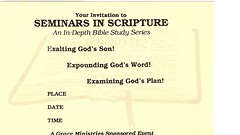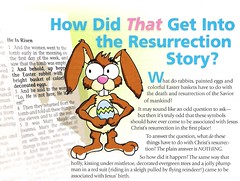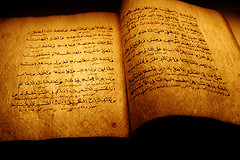Dear Gentle reader,
When one truly seeks answers one comes face to face with the questions that the Book of Job deals with in an extended epic of great proportions.
One can accept that this is a Historical book filled with facts or merely an allegory of the fate of men in general. Which ever side you choose there are grand moral lessons to be learned if (and that’s the rub if you are willing to set aside your preconceived notions and really get past the Religious scenery to the heart of the matter. Dr Arthur Custance said in his book Seed of the Woman "The Words of Scripture are for Children The thoughts are for men"
I will assume that you have graduated from merely looking at words to attempting to understand the thoughts behind them.
To many the book of Job is a record of unrelieved gloom, with Job longing to be where ‘the wicked cease from troubling, and the weary are at rest’. This however is only part of the truth revealed.Suffering is answered by comfort and consolation, reproach and loss give place to honour and blessing.The fruits of victory are given to one who by his faith endured and overcame.
The author draws back the curtain and shows how this ancient record came into the hands of one ‘learned in all the wisdom of the Egyptians’. Here, Moses would read for the first time truths that form part of the book of Genesis; Adam’s sin, the Sons of God, the majesty of the Creator and the vastness of His handiwork. Not only so, but here he would read of a Redeemer who lived, of a Ransom provided, and of a hope that through Him man may be raised from sleep in the dust of the earth. The conclusion is inescapable that such a book would not only influence but impart power and wisdom to the man chosen to be the deliverer and lawgiver of Israel.
When we speak of the inspiration of Scripture, we must be careful not to exclude ordinary sources of information. The inspiration of the book of Kings for example is not in any sense invalidated by the fact that whoever compiled that book under the guidance of God, did not hesitate to avail himself of existing records, a special inspiration is not required if such record as is available should at the same time be true. Consequently we find reference is made to ‘the book of the acts of Solomon’ (1 Kings 11:41); to a ‘book of the chronicles of the kings of Judah’ (1 Kings 14:29); and to a ‘book of the chronicles of the kings of Israel’ (1 Kings 14:19). We also learn
from 1 Chronicles 29:29 that Samuel, Nathan and Gad compiled a history (margin) of the ‘acts of David the king, first and last’. We discover from Daniel 9:2 that the great prophecy of the ‘seventy sevens’ grew out of reading the writings of Jeremiah, and Luke, in the New Testament provides us with an instance of one who though claiming to have had ‘perfect understanding of all things from the very first’ (‘from above’ anothen) nevertheless used the testimony of ‘eye-witnesses’ who testified of those things which were most surely believed (Luke 1:1-4).
When we turn to the first of the books of Moses, it becomes evident that the opening chapters dealing with Creation are a direct revelation, but that the bulk of the book of Genesis is composed of the records that were compiled since the days of Adam, beginning with ‘The book of the generations of Adam’ in Genesis 5:1. It is evident, when reading Genesis 23:17-20, that Moses had a document before him, for he records the original place name Machpelah, but brings it up to date by informing the reader that ‘The same is Hebron in the land of Canaan’ (see also verse 2). In the book of Genesis therefore we have a history, preceded by a revelation which deals with
Creation and Satanic interference, important elements which apparently were not included in the ‘Book of the generations of Adam’, yet which are vital to a true understanding of the book as a whole. If Moses had access to the documents, or ‘generations’ as they are termed, that give an unbroken account of the life of man from Adam to Noah, from Noah to Abraham, and from Abraham to the twelve sons of Jacob.
So with my understanding I hold that the Book of Job was the first book written although not the book first in your Bible. We begin with the introduction and we would call this the set-up
Now there was a day when the sons of God came to present themselves before the LORD, and Satan came also among them.
And the LORD said unto Satan, Whence comest thou? Then Satan answered the LORD, and said, From going to and fro in the earth, and from walking up and down in it.
And the LORD said unto Satan, Hast thou considered my servant Job, that there is none like him in the earth, a perfect and an upright man, one that feareth God, and escheweth evil?
Then Satan answered the LORD, and said, Doth Job fear God for nought?
Hast not thou made an hedge about him, and about his house, and about all that he hath on every side? thou hast blessed the work of his hands, and his substance is increased in the land.
But put forth thine hand now, and touch all that he hath, and he will curse thee to thy face.
And the LORD said unto Satan, Behold, all that he hath is in thy power; only upon himself put not forth thine hand. So Satan went forth from the presence of the LORD. (Job 1:6-12)
What we gather from this brief introduction is that the author wants his readers to learn this simple truth "it is the end of the Lord" that is to say the end to which Job was brought the confession of human impotence in attaining righteousness and thankfully casting himself on Divine Omnipotence for the rescuing or (salvation) of Himself.
We also see the his three friends (I used to call them the three stooges Larry Curly and Mo ). Today, I would called them the 3 Psychiatrist! ("Here is my solution for your troubles take this pill") The 3 show the impotence of human experience Eliphaz, represents Human experience. Bildad, human tradition, and Zophar human merit.

Next time,
Love, Denis











